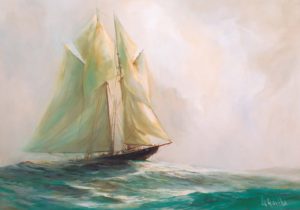
History
Bluenose: Behind the sails
The symbolism of the iconic Canadian fishing and racing schooner Bluenose may be as relevant today as it was 100 years ago when the ship first hit the water
- 3226 words
- 13 minutes
This article is over 5 years old and may contain outdated information.
People & Culture

Canada’s exploration and geography communities were out en masse on Thursday night to help The Royal Canadian Geographical Society launch Franklin’s Lost Ship: The Historic Discovery of HMS Erebus, by John Geiger and Alanna Mitchell, a book detailing the discovery and ongoing exploration of one of the most important underwater discoveries in history.
More than 100 people packed the Common Room at Massey College, in Toronto, for the event, among them exploration great Joe MacInnis, storm chaser George Kourounis, medical geographer (and newly re-elected MP) Kirsty Duncan, writers Ken McGoogan and Shelagh Grant, and artist Cory Trepanier.
The fate of the 1845-48 British Arctic Expedition commanded by Sir John Franklin, and in particular of his ships, HMS Erebus and Terror, was one of exploration’s greatest mysteries — until last year, when Parks Canada underwater archeologists first laid eyes on a sonar image of Erebus, lying on the floor of Queen Maud Gulf.
Franklin’s Lost Ship is an account of the ambitious Parks Canada-led search — which involved the largest number of ships since the early 1850s — and the discovery, bringing readers onto the decks of Canadian Coast Guard ship Sir Wilfrid Laurier, the Martin Bergman and the One Ocean Voyager as the vessels sought to end the mystery.
The book is co-authored by Geiger, CEO of the RCGS and author of seven books including (with forensic anthropologist Owen Beattie) Frozen In Time: The Fate of the Franklin Expedition, and award-winning science journalist Alanna Mitchell, author of the international best-seller Sea Sick: The Global Oceans in Crisis.

Paul Ruest, President of the RCGS, welcomed guests and congratulated Geiger for involving the Society in the 2014 Victoria Strait Expedition partnership and, with Mitchell, for their work on the book, published by HarperCollins. All proceeds will help support the RCGS’s educational mission.
In her remarks, Mitchell honoured the many scientists involved in the discovery of Erebus, stating, “This is a group who are going to produce astounding amounts of knowledge and research for the world. To the scientists that are here, and all of those who aren’t, thank you — you really have made us proud to be Canadian.”
Mitchell also thanked Louie Kamookak — the Inuit historian whose accounts of oral history are largely credited with refocusing the search in the region where HMS Erebus was eventually found — saying, “His extraordinary perseverance and determination, listening to the stories of his ancestors and putting together some of the most crucial pieces of the story, were invaluable.” Mitchell recently returned from King William Island, where she had joined an expedition led by Kamookak, on behalf of The Royal Canadian Geographical Society.

Geiger added thanks to partners involved in the search, acknowledging representatives present at the book launch, from Parks Canada to The W. Garfield Weston Foundation and One Ocean Expeditions. He singled out Jonathan Moore of Parks Canada’s Underwater Archaeology Service, who was one of the discoverers of Erebus and who found the ship’s bell, calling him “one of the most remarkable people you will have the chance to meet — so if you brought your camera, make sure you get a selfie with him before you go.”
Moore offered guests a first-hand walkthrough of some of the profound moments detailed in the book, and described his experiences from some of his 150-plus dives, including this summer’s work: “With incredible underwater visibility we kicked off the season with a study on the marine biology of the wreck. HMS Erebus is actually an artificial reef, festooned with life — so we conducted the biological study and about 2½ weeks of archeological diving. Peeling back some of the kelp growth on the shipwreck was like unwrapping a giant Christmas present; every time you removed kelp, something on the wreck was revealed. New artifacts or structural features.”
Franklin’s Lost Ship offers unique insight into the discovery, Moore said.
“You have photographs of the transfer of the Investigator from the One Ocean Voyager to Laurier, which was a sight to behold. You have the story of artifacts that were discovered on land, by a team under the lead of Doug Stenton, which really caused the marine search to move closer to where Erebus was ultimately discovered. With Franklin’s Lost Ship, you get to learn about the terrestrial finds that put us one step closer to the shipwreck discovery,” explained Moore.
“You get the trials and tribulations of One Ocean Voyager dodging the ice and trying to get Arctic Explorer [the sonar-carrying AUV (autonomous underwater vehicle)] into the water — in what we now know as the “Terror search area.” Then you go all the way through to one of our first archeological dives on the wreck, where Ryan Harris and I were the first ones to get in the water — having been on every search project since 2008.”
Andrew Prossin, Managing Director of One Ocean Expeditions, concluded the speaking program by talking about the impact that the find has had on stimulating interest in the Arctic, and in visiting polar regions.
Besides Ruest, RCGS Governors Wendy Cecil, David Mitchell and Joseph Frey attended, as did former governors Philip Howarth and Kathryn McCain.
Franklin’s Lost Ship: The Historic Discovery of HMS Erebus is a 224-page hardcover book published by HarperCollins. It will be available in bookstores across Canada on October 27, 2015, and can be pre-ordered here.
Are you passionate about Canadian geography?
You can support Canadian Geographic in 3 ways:
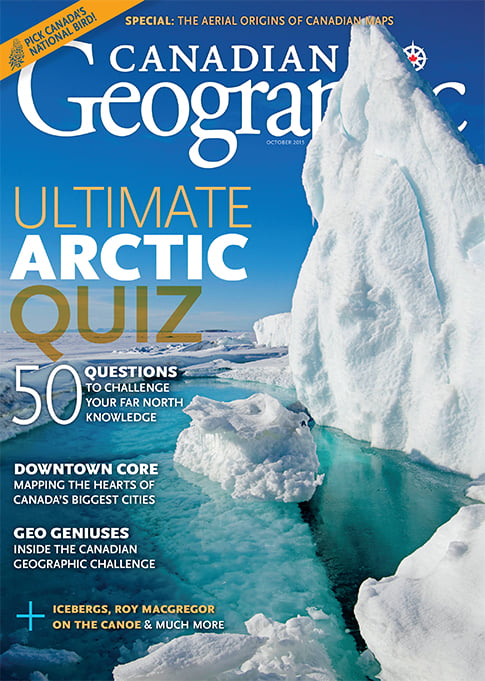
This story is from the October 2015 Issue

History
The symbolism of the iconic Canadian fishing and racing schooner Bluenose may be as relevant today as it was 100 years ago when the ship first hit the water
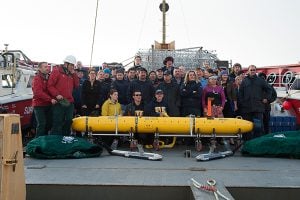
History
Why this summer’s search for the lost ships of the Franklin Expedition will be the biggest and most advanced ever
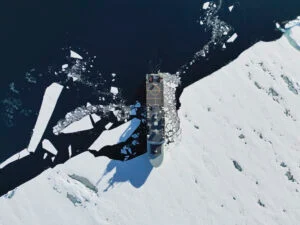
People & Culture
As the climate heats up, so do talks over land ownership in the Arctic. What does Canadian Arctic Sovereignty look like as the ice melts?
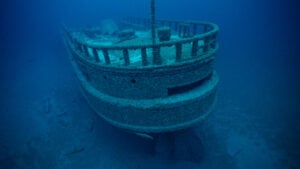
Exploration
Yvonne Drebert and Zach Melnick set out to make a documentary about invasive quagga mussels in the Great Lakes. Along the way, they found the wreck of what is likely the steamship Africa, last seen on a stormy October night in 1895.